A mouthwatering variation of the traditional Greek galaktoboureko made with kataifi dough (shredded phyllo dough)! Golden crispy kataifi dough wrapped around fluffy aromatic semolina custard and bathed in syrup.. Well one couldn’t ask for more! Except maybe for that scoop of vanilla ice cream on top ;).
Making this Galaktoboureko with kataifi dough may sound a bit intimidating but if you follow my detailed recipe you will find out that it’s actually surprisingly simple!
There are three key steps to make this delicious dessert:
- The first one is to prepare the syrup, which is really easy. All you have to do is put all the ingredients in a pot and bring to a boil.
- The second step is to prepare the custard, which is the most tricky one, but I’ve got you covered below with my tips and tricks.
- And the third step is to work with the kataifi dough and assemble the galaktoboureko.
So lets get started!
How to work with kataifi dough
Kataifi dough is a variation of the traditional phyllo dough, but instead of it being layer out in large sheets, it is made of fine strains of dough! If you’ve never worked with Kataifi dough (shredded phyllo) before, here are my tips to help you handle it right the first time:
- It is very important to thoroughly defrost the kataifi dough. The key here is to let the dough defrost in the fridge overnight and not at room temperature, in order to prevent it from getting soggy.
- Kataifi dough dries out very quickly, so it’s best to keep exposure to air at a minimum. Remove the plastic wrap only when you are ready to use it and when you are done preparing my Galaktoboureko with Kataifi, put it straight into the oven to bake.
- Also to prevent it from drying, cover the kataifi dough with a damp towel and keep it covered, while you prepare the rest of the galaktoboureko.
- Work the dough gently with your hands on a large surface or over the sink, so that you don’t end up with a kitchen filled with scattered shredded dough!
- Untangle the kataifi with your hands, making sure that there are no knots. Spread the kataifi apart, so that its strands are separated.
- When it comes to buttering the dough, drizzle with a generous amount of butter. This will help the kataifi dough bake throughout. Just make sure not to touch and push the dough with your brush, so that it remains fluffy.
How to prepare the custard for the Galaktoboureko with kataifi
The Galaktoboureko with Kataifi custard consists of two separate mixtures that are combined in the end.
The first mixture is a semolina based custard made from cream, milk, sugar, vanilla and butter. To prepare it you’ll be heating up your cream, milk, sugar, vanilla and semolina and mix until the ingredients combine and form a cream.
Tip: Add the semolina slowly to the warm milk and whisk constantly to prevent it from forming lumps.
Make sure you use some good quality heavy cream. After plenty of experimenting I’ve found that the best custard texture and flavour comes from using a good quality double/heavy (35%+ in fat) cream. This will make your custard filling silky smooth and will taste simply divine!
The second mixture are the eggs beaten with sugar. It is important to whisk the eggs until foamy, glossy and having formed soft peaks. This could take about 4-5 minutes using an electric stand or hand mixer. It is done when you lift your whisk and the mixture is holding its shape but is still soft in texture.
Tip: You could also use a hand whisker if you don’t have an electric mixer, but it could take a bit longer. Make sure you keep your mixer bone dry.
The egg mixture is then folded in the semolina mixture with light movements so that it gives the custard volume and becomes more fluffy.
Using a spatula add some of the egg-sugar mixture in the custard mixture and fold with light circular movements from the bottom up. Gradually add all the egg mixture and fold. Set aside to cool down.
Tip: Make sure the semolina mixture is cool enough (under 50C/120F) when folding in your eggs so they don’t scramble.
How to prepare the Greek Galaktoboureko with Kataifi Syrup
No Galaktoboureko is complete without some delicious syrup! You can experiment with different flavourings, but my favourite are cinnamon and lemon, which I find make it taste incredibly fresh and smell absolutely divine!
To prepare the syrup simply pour all the ingredients besides the honey in a small pot and bring it to the boil. Let it boil until all of the sugar has fully dissolved. Remove it from the heat, add the honey, stir and let it sit until it fully cools down. You’ll need your syrup to be at room temperature when the Galakroboureko with kataifi comes out of the oven so make sure you make your syrup first!
Similar recipes to try
If you love a traditional syrupy greek desert, the below recipes are made for you! Enjoy!
- Baklava Cheesecake
- Chocolate Baklava
- Traditional Greek Baklava Recipe with Walnuts and Honey
- Greek baklava rolls recipe (Saragli)
- Chocolate Souffle in Baklava Pouches recipe
- Galaktoboureko with Kataifi (Greek Custard and shredded phyllo pie)
- Homemade Kataifi recipe
- Greek Ekmek Kataifi recipe (Custard and whipped cream pastry with syrup)
- Greek Yogurt Cake Soaked in Syrup Recipe (Yiaourtopita)
- Karidopita/Karithopita recipe (Greek Walnut Cake with Syrup)
- Greek Ravani / Revani recipe (Coconut cake with syrup)
- Traditional Greek Galaktoboureko recipe (Greek Custard Pie with Syrup)
- Loukoumades recipe (Greek Donuts with Honey and Walnuts)
- Orange cake with syrup – Portokalopita
- Samali – Semolina cake with mastic syrup
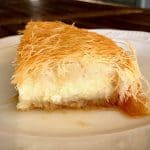
Greek Galaktoboureko with Kataifi (Custard and shredded phyllo pie)
- Prep Time: 30 min
- Cook Time: 90 min
- Total Time: 2 hours
- Yield: 15-16 pieces 1x
- Category: Dessert
- Method: Baked
- Cuisine: Greek
Description
A mouthwatering variation of the traditional Greek galaktoboureko with kataifi dough (shredded phyllo dough)! Golden crispy kataifi dough wrapped around fluffy aromatic semolina custard and bathed in syrup.. Well one couldn’t ask for more!
Ingredients
Base Ingredients
- 500g kataifi dough (18 oz.)
- 250g butter (9 oz.)
For the Syrup
- 450g water (16 ounces)
- 780g sugar (28 ounces)
- peel of 1 lemon
- a cinnamon stick
- 10 drops of lemon juice
- 100g honey (3 ounces)
For the Custard
- 160g finely ground (thin) semolina (6 oz.)
- 220g sugar (7.5 oz.)
- 500g milk (17.6 oz.)
- 4 eggs
- 70g butter (2.5 oz.)
- 500g double (heavy) cream (17.6 oz)
- 1 tsp vanilla extract
- a pinch of salt
Instructions
Prepare the syrup
- To make this Galaktoboureko with Kataifi recipe, start by preparing the syrup. Into a small pot add the sugar, the water and lemon peel, cinammon stick and lemon juice and bring to the boil. Let it boil until the sugar has dissolved.
- Remove the pan from the stove, add the honey and stir. Leave the syrup aside to cool completely.
Prepare the custard
- To prepare your custard for this Galaktoboureko with Kataifi, pour into a saucepan the milk, the cream and half the sugar, and bring to the boil, making sure that you don’t whisk the mixture as the sugar at the bottom of the pan protects the milk from burning.
- As soon as it comes to the boil and heats up, gradually add the semolina and the vanilla extract, whilst whisking. Turn the heat down to medium heat and whisk constantly until the mixture becomes creamy.
- Remove the pan from the stove, add the butter and a pinch of salt and fold. Let it cool down while you are preparing your meringue. Just remember to whisk it once in a while so it doesn’t form a skin on top.
- Place the eggs and the rest of the sugar in a mixing bowl. Use an electric mixer or electric hand whisk to whisk the eggs and sugar until the mixture is very fluffy and foamy and forms soft peaks. If using a mixer, set it to high speed and whisk for about 5 minutes.
- Now fold together the two mixtures, from step 3 and step 4. With a spatula add 1/4 the egg-sugar mixture in the custard mixture and blend with a light circular motion from the bottom up. Gradually add all the mixture and fold. Set aside to cool.
Assemble the Galaktoboureko
- For this Galaktoboureko Kataifi recipe, you need a large baking pan, approx. 25x30cm (or round 28cm diameter) / 10 x 12 inch.
- Melt the butter (low heat) and butter the bottom and sides of the baking pan.
- Untangle the kataifi using your hands, making sure that there are no knots and spread the kataifi apart, so that there are no tangles. This process should take about 4 minutes.
- Add a bit more than half of the kataifi on the bottom of the baking pan.
- Using your brush, sprinkle thoroughly the Kataifi with half of the melted butter. Make sure not to touch the dough with the brush.
- Tip in the custard, smoothing the surface with a spatula
- Cover the custard with the remaining kataifi. Press it down lightly and shape it. Use your pastry brush to help you turn the Kataifi dough towards the outer edges and bottom of the pan to seal the galaktoboureko with kataifi.
- Drizzle the remaining melted butter on top.
Bake the Galaktoboureko
- Preheat the oven to 160C/ 320F.
- Bake for approximately 90 minutes, until golden and crispy. If you see it browning to quickly cover it with some aluminium foil.
- As soon as the Galaktoboureko is ready, slowly ladle the cold syrup over the pastry. The kataifi galaktoboureko needs to be hot and the syrup cool.
- Once the syrup is fully absorbed and the kataifi galaktoboureko is cool to the touch it is ready to serve. This should take about 1-1 1/2 hours! Enjoy!
Keywords: galaktoboureko with kataifi

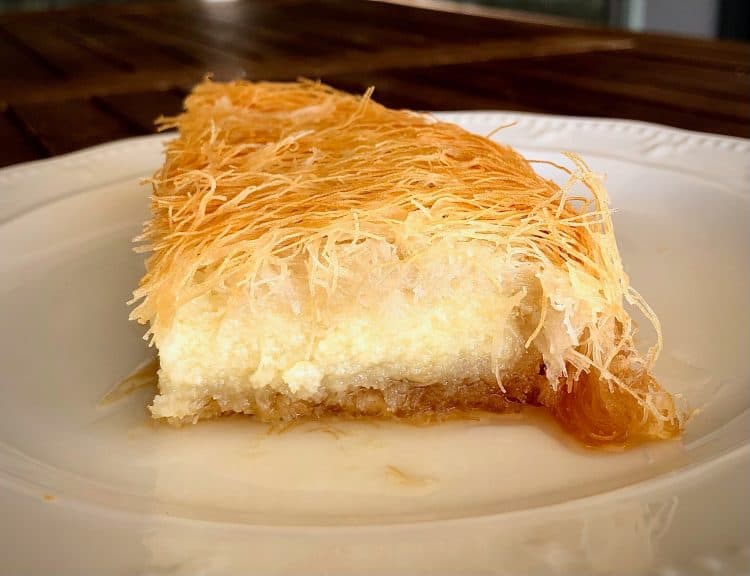
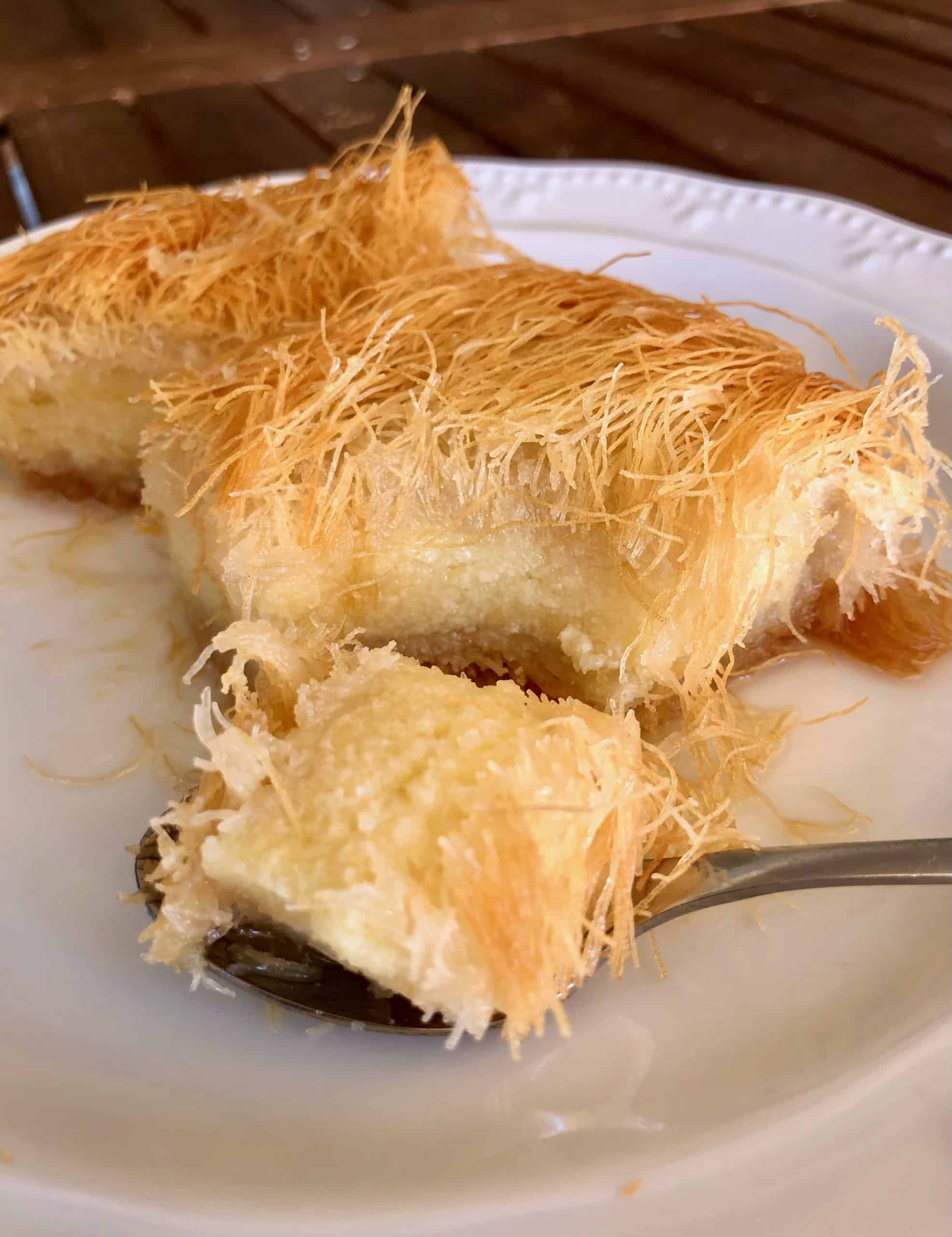
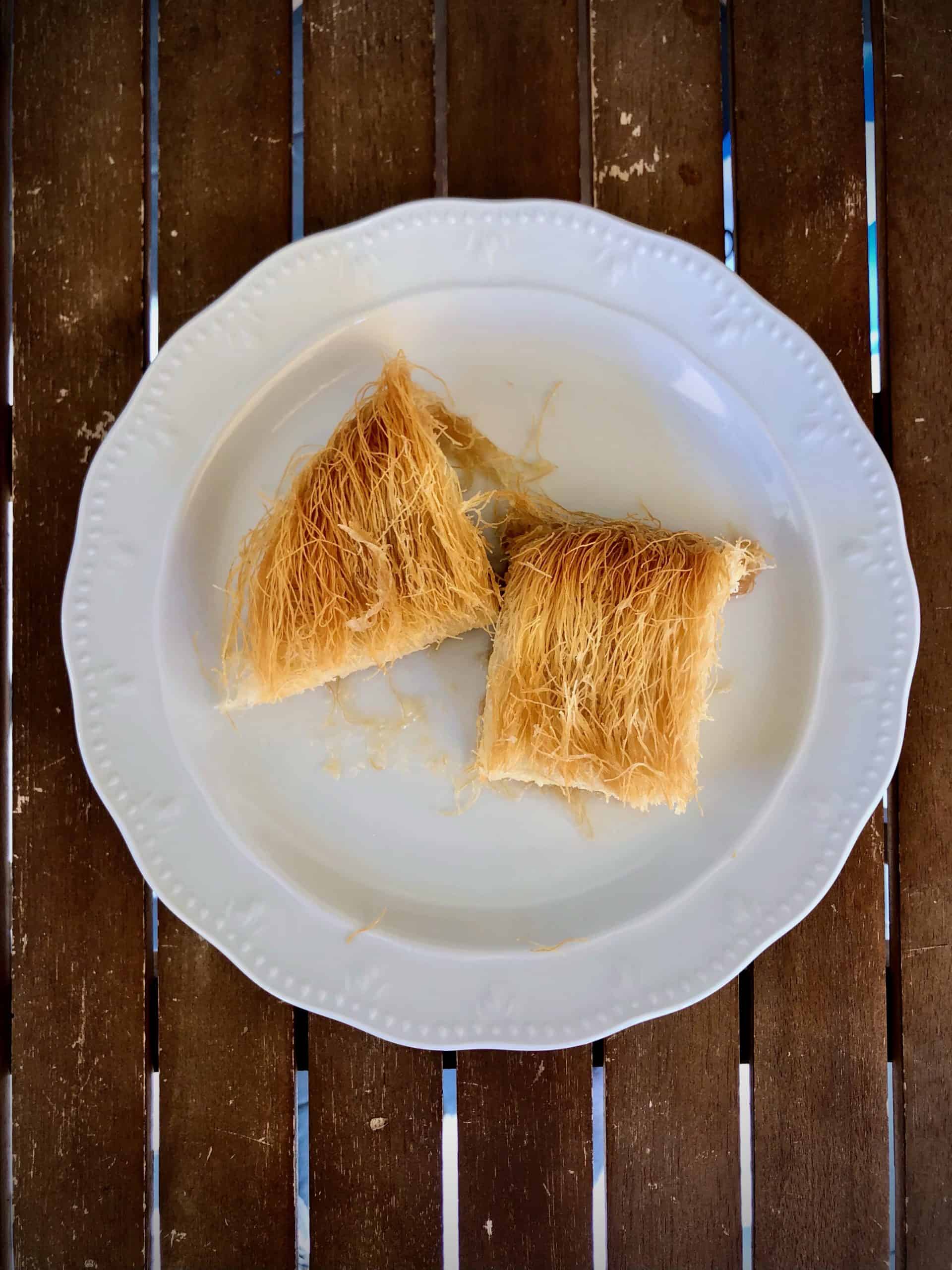
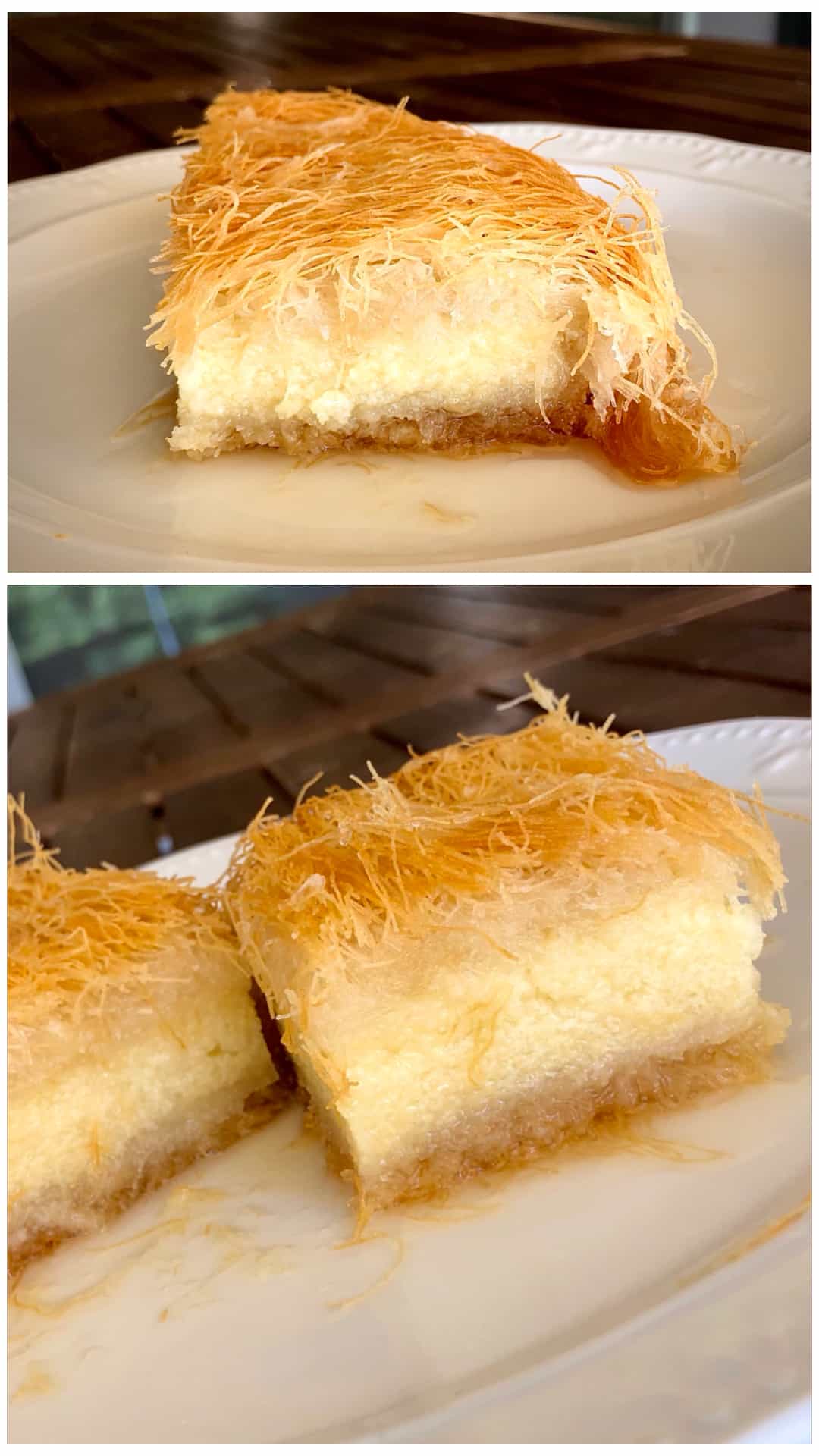
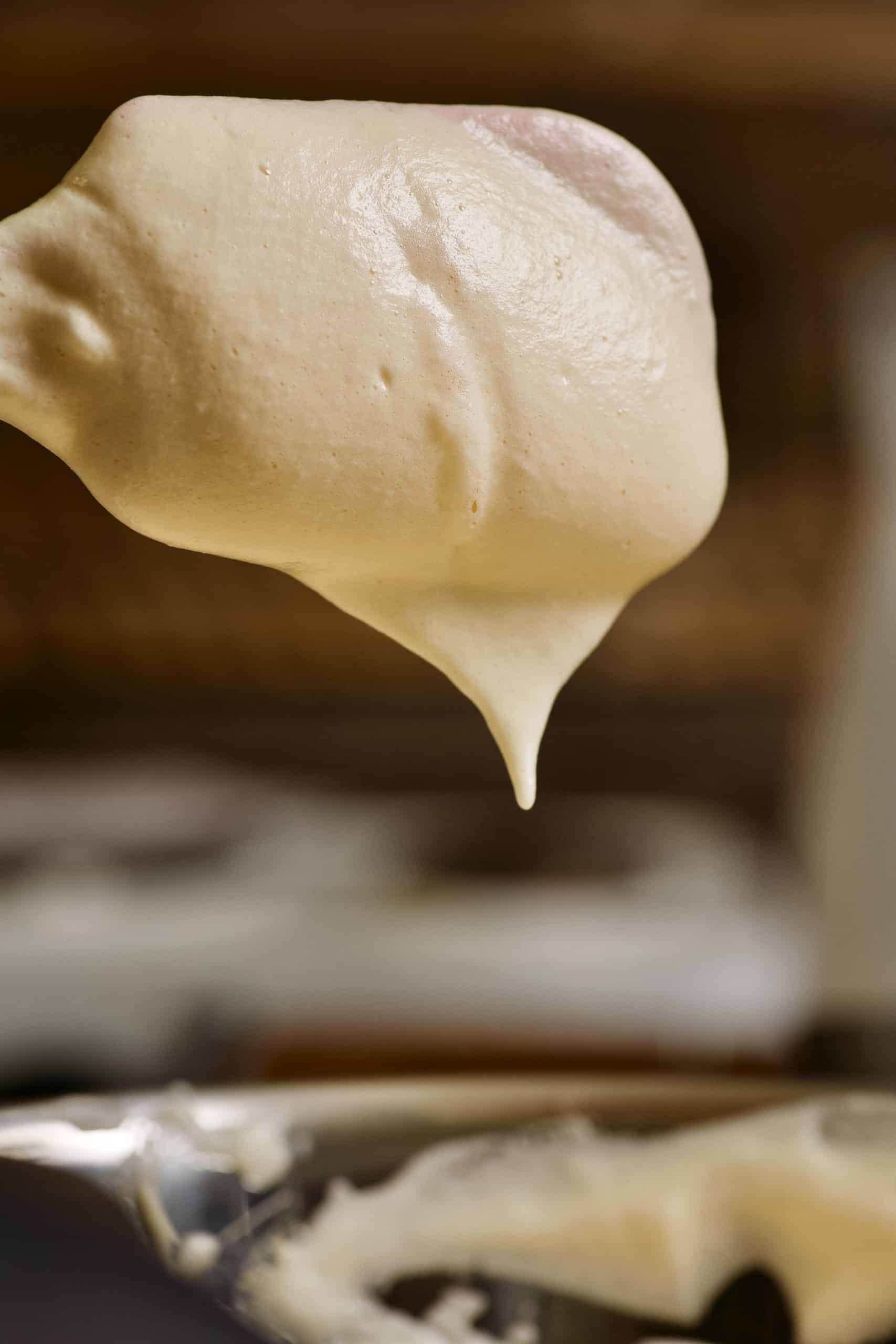
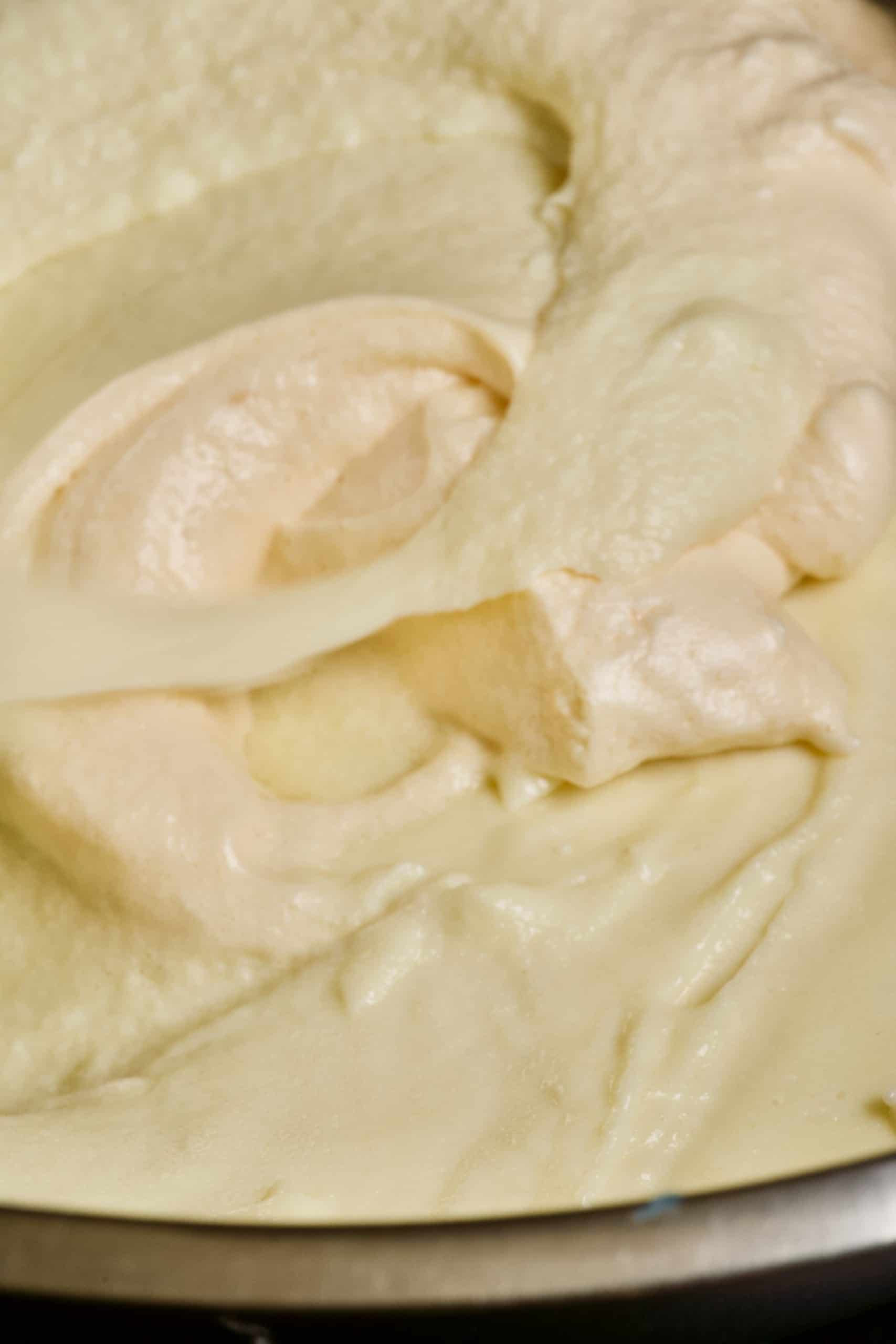
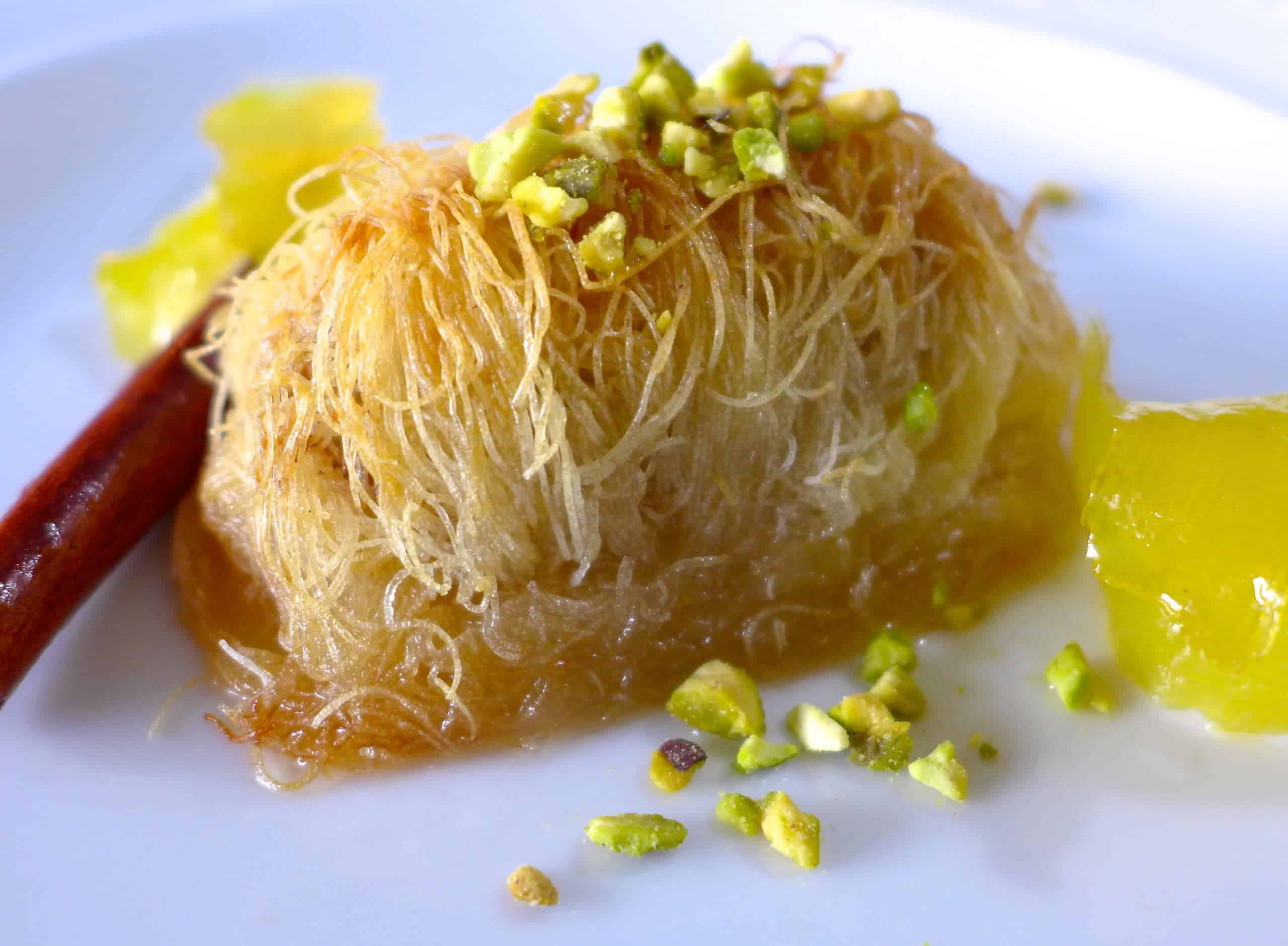
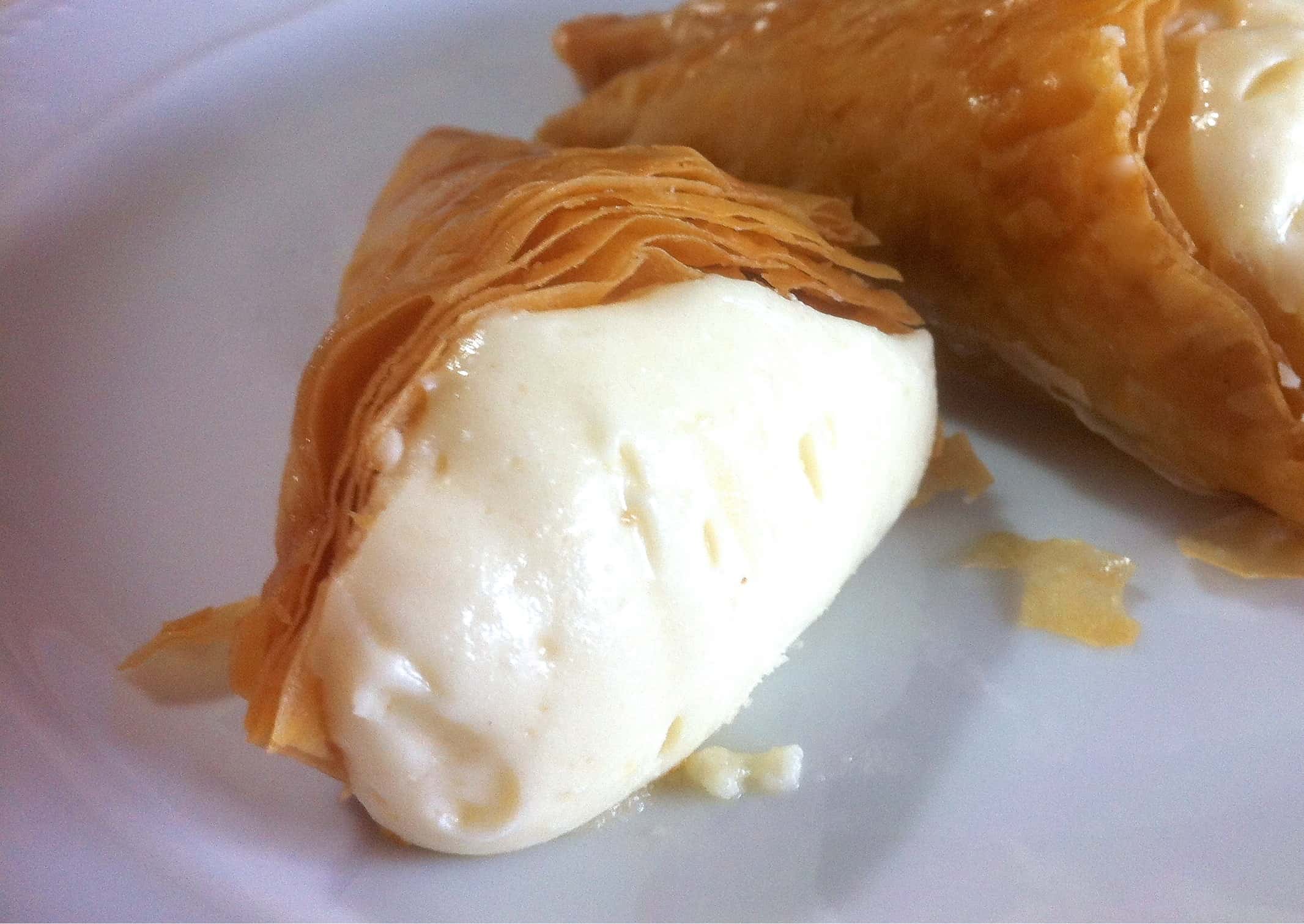
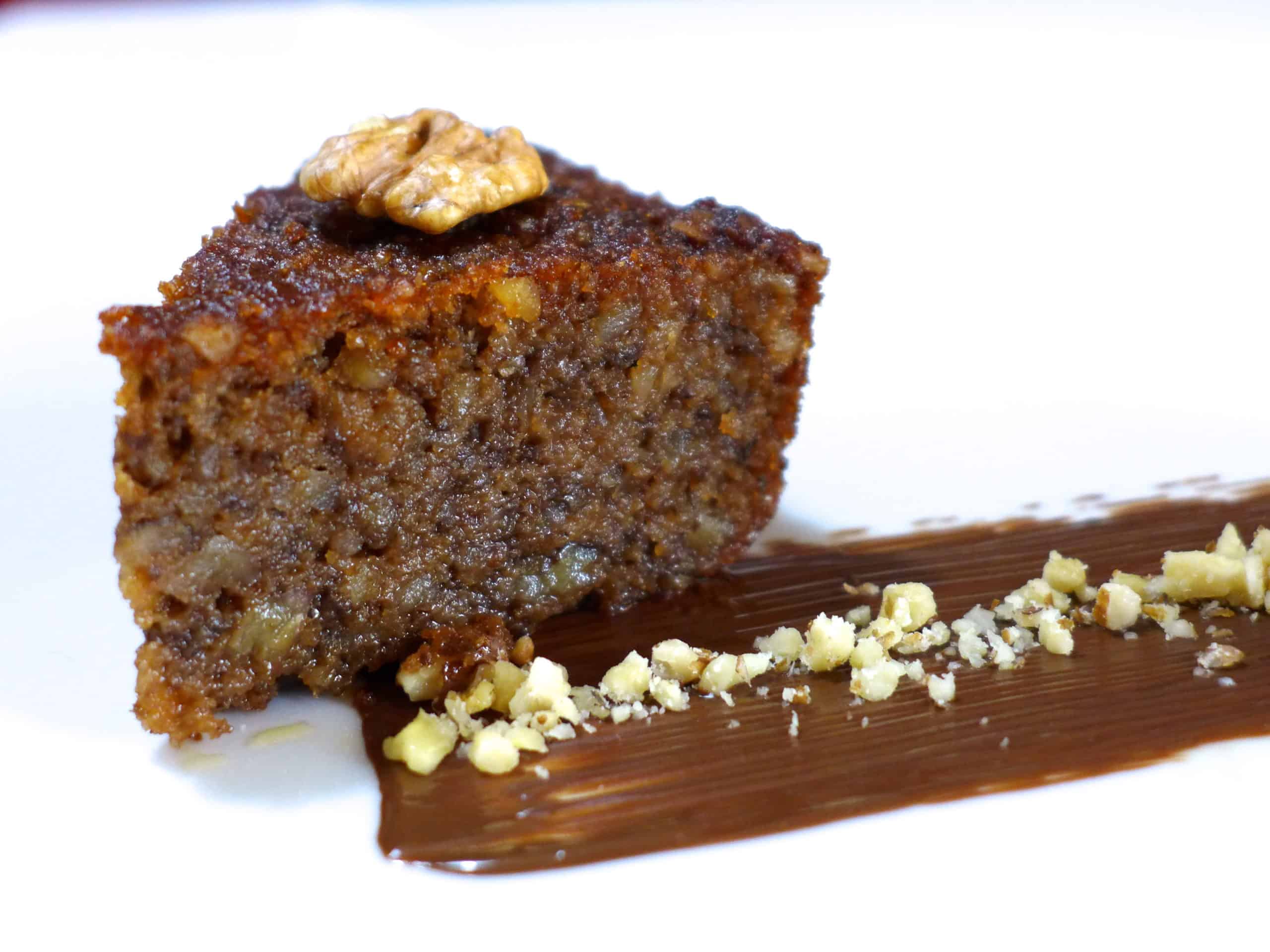
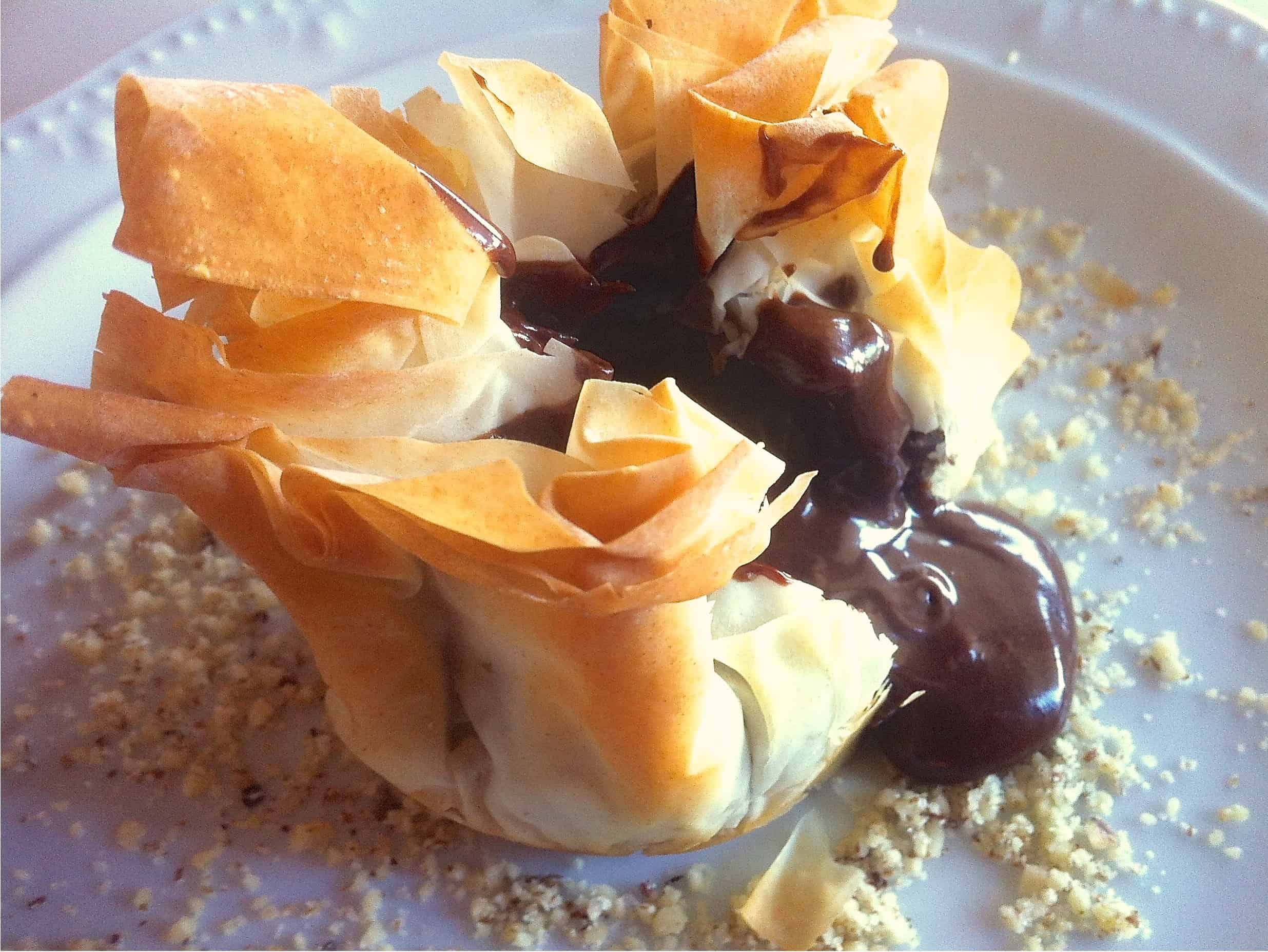
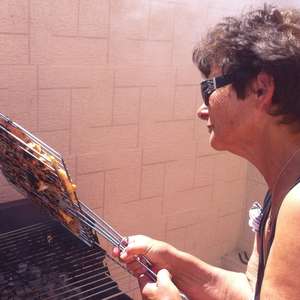
MY FAVORITE!!!
One of my favourites too :)!!
I tried the recipe today. It turns out very good. However there was not enough syrup. I think the water in the syrup should be much more.
Hi Kostas,
Thank you for the feedback! I’ve bumped up the syrup quantity in the recipe 🙂
I had this dessert in a Greek Restaurant in Redwood City CA. some 30 years ago. It was so popular that when you sat down at the table, the first thing they asked was “Do you want the dessert?” it sold out quickly. I loved it so much. Sadly they closed down a few years later. I never could find a recipe for it asking many chefs and Greeks, until now. My error in describing it was that the crunchy part was shredded wheat. Now I know. Thank you I’m glad I found your web site
First time seeing Greek recipes, love Greek food.